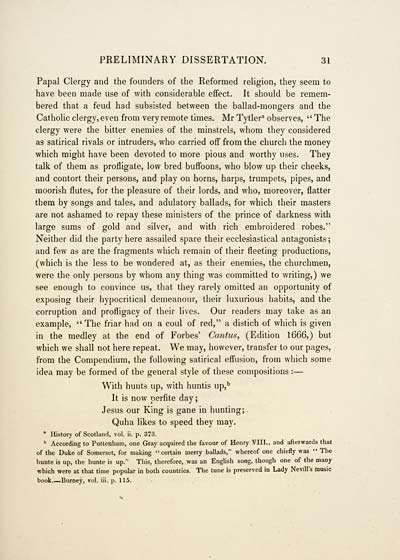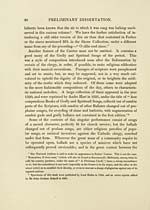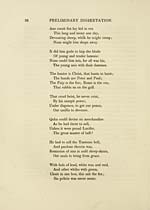Inglis Collection of printed music > Printed text > Ancient Scotish melodies from a manuscript of the reign of King James VI
(49) Page 31
Download files
Complete book:
Individual page:
Thumbnail gallery: Grid view | List view

PRELIMINARY DISSERTATION. 31
Papal Clergy and the founders of the Reformed religion, they seem to
have been made use of with considerable effect. It should be remem-
bered that a feud had subsisted between the ballad-mongers and the
Catholic clergy, even from very remote times. Mr Tytler a observes, " The
clergy were the bitter enemies of the minstrels, whom they considered
as satirical rivals or intruders, who carried off from the church the money
which might have been devoted to more pious and worthy uses. They
talk of them as profligate, low bred buffoons, who blow up their cheeks,
and contort their persons, and play on horns, harps, trumpets, pipes, and
moorish flutes, for the pleasure of their lords, and who, moreover, flatter
them by songs and tales, and adulatory ballads, for which their masters
are not ashamed to repay these ministers of the prince of darkness with
large sums of gold and silver, and with rich embroidered robes."
Neither did the party here assailed spare their ecclesiastical antagonists;
and few as are the fragments which remain of their fleeting productions,
(which is the less to be wondered at, as their enemies, the churchmen,
were the only persons by whom any thing was committed to writing,) we
see enough to convince us, that they rarely omitted an opportunity of
exposing their hypocritical demeanour, their luxurious habits, and the
corruption and profligacy of their lives. Our readers may take as an
example, " The friar had on a coul of red," a distich of which is given
in the medley at the end of Forbes' Cantus, (Edition 1666,) but
which we shall not here repeat. We may, however, transfer to our pages,
from the Compendium, the following satirical effusion, from which some
idea may be formed of the general style of these compositions : —
With hunts up, with huntis up, b
It is now perfite day;
Jesus our King is gane in hunting;
Quha likes to speed they may.
* History of Scotland, vol. ii. p. 373.
b According to Puttenham, one Gray acquired the favour of Henry VIII., and afterwards that
of the Duke of Somerset, for making "certain merry ballads," whereof one chiefly was " The
hunte is up, the hunte is up." This, therefore, was an English song, though one of the many
which were at that time popular in both countries. The tune is preserved in Lady Nevill's music
book Burney, vol. iii. p. 115.
Papal Clergy and the founders of the Reformed religion, they seem to
have been made use of with considerable effect. It should be remem-
bered that a feud had subsisted between the ballad-mongers and the
Catholic clergy, even from very remote times. Mr Tytler a observes, " The
clergy were the bitter enemies of the minstrels, whom they considered
as satirical rivals or intruders, who carried off from the church the money
which might have been devoted to more pious and worthy uses. They
talk of them as profligate, low bred buffoons, who blow up their cheeks,
and contort their persons, and play on horns, harps, trumpets, pipes, and
moorish flutes, for the pleasure of their lords, and who, moreover, flatter
them by songs and tales, and adulatory ballads, for which their masters
are not ashamed to repay these ministers of the prince of darkness with
large sums of gold and silver, and with rich embroidered robes."
Neither did the party here assailed spare their ecclesiastical antagonists;
and few as are the fragments which remain of their fleeting productions,
(which is the less to be wondered at, as their enemies, the churchmen,
were the only persons by whom any thing was committed to writing,) we
see enough to convince us, that they rarely omitted an opportunity of
exposing their hypocritical demeanour, their luxurious habits, and the
corruption and profligacy of their lives. Our readers may take as an
example, " The friar had on a coul of red," a distich of which is given
in the medley at the end of Forbes' Cantus, (Edition 1666,) but
which we shall not here repeat. We may, however, transfer to our pages,
from the Compendium, the following satirical effusion, from which some
idea may be formed of the general style of these compositions : —
With hunts up, with huntis up, b
It is now perfite day;
Jesus our King is gane in hunting;
Quha likes to speed they may.
* History of Scotland, vol. ii. p. 373.
b According to Puttenham, one Gray acquired the favour of Henry VIII., and afterwards that
of the Duke of Somerset, for making "certain merry ballads," whereof one chiefly was " The
hunte is up, the hunte is up." This, therefore, was an English song, though one of the many
which were at that time popular in both countries. The tune is preserved in Lady Nevill's music
book Burney, vol. iii. p. 115.
Set display mode to: Large image | Transcription
Images and transcriptions on this page, including medium image downloads, may be used under the Creative Commons Attribution 4.0 International Licence unless otherwise stated. ![]()
| Special collections of printed music > Inglis Collection of printed music > Printed text > Ancient Scotish melodies from a manuscript of the reign of King James VI > (49) Page 31 |
|---|
| Permanent URL | https://digital.nls.uk/94690700 |
|---|
| Description | Scottish and English songs, military music and keyboard music of the 18th and 19th centuries. These items are from the collection of Alexander Wood Inglis of Glencorse (1854 to 1929). Also includes a few manuscripts, some treatises and other books on the subject. |
|---|
| Description | The Glen Collection and the Inglis Collection represent mainly 18th and 19th century Scottish music, including Scottish songs. The collections of Berlioz and Verdi collected by bibliographer Cecil Hopkinson contain contemporary and later editions of the works of the two composers Berlioz and Verdi. |
|---|

